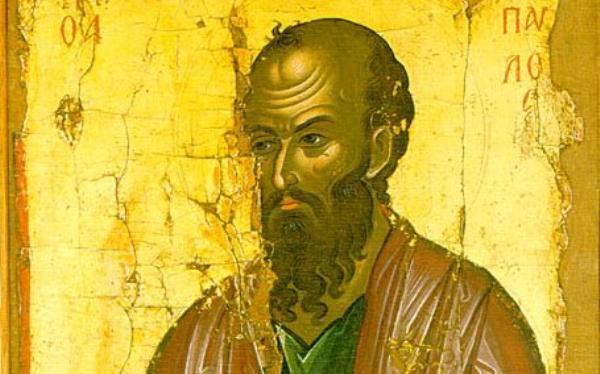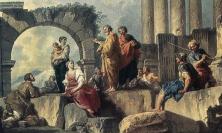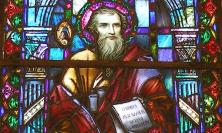
As we conclude the Year of St Paul, Brian Purfield looks at Paul’s Letter to the Colossians, in which the primacy of Christ is highlighted. The apostle tells the Christians at Colossae that Christ is the ‘the first-born of all creation’ – why was this such an important message for Paul to teach, and how do we let this shape our faith?
The letter to the Colossians is addressed to a Christian community in the Lycus Valley in Asia Minor, about 100 miles east of Ephesus. Problems had arisen among the Christians at Colossae, brought on by some teachers who spoke of Christ’s relation to the universe (cosmos). Paul’s letter, as we shall see, was an attempt to dispel the misconceptions about Jesus’ place in the world and to stress to the Colossians the primacy of Christ: their faith in him was not supposed to fit in to their worldview, it must be their worldview.
Colossae was regarded as an important city in the 5th century BCE and later, but it was gradually outstripped by Laodicea and Hierapolis so that by the 1st century CE it was considered a smaller town. A severe earthquake in 60-1 CE may have contributed further to its decline. Paul himself did not found the Colossian church (Col 2:1) and, at the time of writing this letter, had not visited there (1:4). The church was apparently established by Epaphras who was from Colossae (1:7; 4:12; Philemon 23) and whose greetings Paul sends to the community. (4:12).
The teachings that were a cause of concern to Paul emphasised angels (2:18), ‘principalities and powers’ (2:15) and various ritual observances that were laid out in a calendar organised around the heavenly bodies, sun, moon, and stars (2:16). It appears that the Gentile Christians of the area were attracted to an esoteric form of Judaism which included rules about food and drink and ascetical disciplines (2:18). In his letter, Paul insists that these practices detract from the person and work of Christ for salvation. He sets this out magnificently in a well-known hymn (1:15-20) and goes on to say that such teachings are but ‘shadows’; Christ is ‘reality’ (2:17).
Background
For help in dealing with the problems that the new teachers posed at Colossae, Epaphras sought out Paul, who we know to have been in prison (4:10,18) – but as he was imprisoned several times the specific place and date of composition are uncertain. Traditionally either the house arrest at Rome, in which Paul enjoyed a certain restricted freedom in preaching (cf. Acts 28:16-28), or a second Roman imprisonment have been claimed as the setting. Others suggest an earlier imprisonment at Caesarea (cf. Acts 23:12 – 27:1) or in Ephesus (cf. Acts 19). Still others regard the letter as the work of a follower of Paul, writing in his name.
The letter follows the usual outline of Paul’s undisputed letters: greeting, thanksgiving and petition, the body of the letter consisting of doctrinal and ethical teachings, and concluding exhortations, travel plans, and related messages and greetings. In fact, the contents of the letter are also closely paralleled by thoughts in Ephesians. If not composed by Paul himself, the letter to the Colossians is probably the earliest example of the reception and adaptation of Paul’s theology in the early church.
The letter is most certainly in the spirit of Paul; it contains much from his language and theology. Like many of Paul’s other letters, it seems to have addressed a real crisis (the attraction of Gentile Christians to an esoteric Judaism), in the churches of the Lycus River Valley region (if not at Colossae itself, which may have been in ruins due to the earthquake). The letter provides sound theological and pastoral advice to Gentile Christians who were trying to figure out who they were as Christians in relation to the intellectual, spiritual and social attractions of the local form of Judaism.
Paul commends the community as a whole (1:3-8). This suggests that, though the Colossians were under pressure to adopt the false doctrines, they had not yet succumbed. Paul expresses his prayerful concern for them (1:9-14). His preaching has led to his persecution, suffering and imprisonment, but he regards these as reflecting the sufferings of Christ, a required discipline for the sake of the gospel (1:24). His instructions to the Christian family and to slaves and masters require a new spirit of reflection and action. Love, obedience and service are to be rendered ‘in the Lord’ (3:18 – 4:1).
Jesus and the Universe
Paul’s earlier writings reflect the gospel that he preached, namely that salvation comes to us in Jesus Christ. He stressed that we are a graced people and that we are the body of Christ (1 Cor 12:12, 27). Later in his life, Paul had to confront a broader question. The question in the Letter to the Colossians is no longer simply: ‘what has Jesus done for me?’ The question is now: ‘what is the relationship of this world, this universe and every creature to Jesus Christ?’ A problem he repeatedly faced was: to what extent can the Gospel sink its roots into a culture and to what extent are there some things in that culture that are not compatible with the Gospel? What is compatible must be embraced and ‘baptised’ or ‘Christianised’ by the Gospel. But there is always the possibility that there is something in a culture that runs contrary to Gospel values.
In recent years there have been some amazing archaeological discoveries in the area around Colossae. What is so striking about the excavations of the city of Ephesus, as it existed at the time of Paul, is the number of temples. Throughout the city there were temples to different gods or goddesses. Clearly the people in Ephesus, as well as those in nearby Colossae, already had a view about this world and their place in it. According to this worldview, the gods were ‘up there’ beyond the sky and the people were ‘down here’ on earth. Between the gods and themselves were a whole host of intermediaries. Furthermore, if you were to live a happy life ‘down here’, you had to keep all these intermediaries happy as they were in charge of some area of your earthly life.
Paul had received word from Colossae about how the people were adapting Christianity to their culture. When the Gospel is preached to the Colossians they are told that Jesus is their mediator before God – but they already had many mediators before God and life seemed to work very well. They therefore asked the question: ‘where does Jesus fit into our system?’ In other words, they were trying to take the Gospel and super-impose it upon their already-existing worldview.
In the letter to the Colossians, Paul in effect tells them that their first mistake is that they are trying to fit Jesus into a system. Jesus does not fit into a system; Jesus is the system. Count the number of times Paul uses the words ‘all’ or ‘everything’ in just five verses of the opening chapter:
He is the image of the unseen God,
the first-born of all creation,
for in him were created all things in heaven and on earth:
everything visible and everything invisible,
thrones, ruling forces, sovereignties, powers -
all things were created through him and for him.
He exists before all things
and in him all thingshold together,
and he is the Head of the Body,
that is the church.
He is the Beginning,
the first-born from the dead,
so that he should be supreme in every way;
because God wanted all fullness
to be found in him
and through him
to reconcile all things to him,
everything in heaven
and everything on earth,
by making peace through his death on the cross.
(Col. 1:15-20)
The words ‘all’ and ‘everything’ run like a chorus through the text. Paul, lying in his prison cell meditating upon Jesus and his relationship to this universe, has come to realise that everything in this world was made for the sake of Jesus Christ. This means that Jesus Christ was not a footnote in God’s history book; he was not an afterthought in the mind of God. Jesus Christ is the first thing in the mind of God. So no matter what else exists or whatever has existed or ever will exist, it exists for the sake of Jesus Christ.
The primacy of Christ
What a marvellous vision of things. We don’t often think of Christ in that way. We often think of Adam as first, because he comes in the first pages of the Bible, and then of Jesus Christ as being sent by God to fix the mess resulting from Adam’s sin. Thus Jesus becomes something of a footnote or an afterthought. But in this passage Paul says to this way of thinking, ‘no, by no means!’ Christ is ‘the first-born of all creation’. The incarnation of Jesus Christ was not something that the Father thought about after Adam sinned; Jesus Christ is the primary idea in the mind of God.
Paul says: ‘he is the image of the unseen God.’ The Greek word here is eikon. An icon is a likeness, a reflection. Paul is saying that Jesus Christ, in his humanity, is a reflection of the unseen God. Paul does not make any judgement on whether or not the thrones, ruling forces, sovereignties and powers that have been the subject of some of the teachings to the Colossians, exist. What Paul is saying to the Colossians is: if they exist, the only reason why they exist is for the sake of Jesus Christ. No one, no being, no thing has come into this world, except that which has been made by God our Father in relationship to Jesus Christ.
In the Letter to the Ephesians, written around the same time, Paul writes:
Blessed be the God and Father
of our Lord Jesus Christ,
who has blessed us in Christ
with every spiritual blessing in the heavenly places.
He chose us in him
before the foundation of the world,
that we should be holy
and blameless before him.
He destined us in love,
to be his children through Jesus Christ,
according to the purpose of his will,
to the praise of his glorious grace
which he freely bestowed on us in the Beloved
(Eph 1:3-6)
Before the world began, God already thought of you and of me – even before Adam came on the scene. So if Jesus Christ is not an afterthought in the mind of God, then neither are you and neither am I. Before creation, God was already thinking of you and me in relationship to Jesus Christ, that we might be lovers of Christ. Paul continues:
In him we have redemption through his blood,
the forgiveness of our trespasses,
according to the riches of his grace
which he lavished upon us.
He has made known to us
in all wisdom and insight
the mystery of his will,
according to his purpose
which he set forth in Christ.
His purpose he set forth in Christ,
as a plan for the fullness of time,
to unite all things in him,
things in heaven and things on earth
(Eph 1:7-10)
God’s plan for all eternity, the mystery he has now revealed, is to bring all things together into one under Christ’s headship: to ‘recapitulate’, as the Greek says, to bring together again. Thus God’s plan is one of restoring all things in Christ. If you restore something, you return it to the way it should have been from the beginning. Therefore when Jesus Christ came into the world, he came to put things back the way they should be, in relationship to himself. When Jesus came into this world, he came not as a stranger, he came to it as to his home (cf. Jn 1:11 ).
Our theology has not always followed this. At the Easter Vigil the Exultet is sung in the light of the Paschal Candle and we hear the words: ‘O happy fault! O necessary sin of Adam, which gained for us so great a redeemer!’ I wonder how Paul would react if he heard those words: ‘No! He is the first-born of all creation. All things take their meaning from him.’ Paul tells us that Jesus’ coming did not depend on Adam; his coming depended upon the overflowing love of God for us. God decided, from the very beginning, to send his Son.
This theology of the primacy and predestination of Christ is one that St. Francis de Sales, the bishop of Geneva at the time of the Reformation, and before him the Franciscan John Duns Scotus, embraced. Francis de Sales wrote his Treatise on the Love of God, and in Book II, chapters I-V he sets out his teaching on the primacy of Christ. He uses the beautiful analogy of the vine and the grape to explain the teaching: ‘the principal reason for planting the vine is the fruit, and therefore the fruit is the first thing desired and aimed at, though the leaves and the buds are first produced.’ On account of the fruit, which is Christ, God planted the vine of the universe. In support of his teaching, Francis de Sales quotes the letter to the Colossians.
If, as Paul says, Jesus is not God’s afterthought, then this whole world is the home of Jesus Christ. It was the overflowing love of God the Father that decreed the incarnation and the overflowing love of God the Son that embraced the suffering by which he would give his life for his friends: ‘no one can have greater love than to lay down his life for his friends’ (Jn 15:13). Therefore any time Christians come alive with love, they are making this world more like the place that God wanted it to be for his Son.
Since everything in this world was made for the sake of Jesus Christ, then it is capable of bringing us closer to God. Paul is convinced that this world, this universe, is the world that belongs to Jesus Christ. He came into this world not as a stranger, but to claim what was his own: ourselves and everything in this world. Therefore whatever we do in this world to bring love to it, we are doing what Jesus came to do. We are restoring it back to its rightful state, putting it back the way God wanted it at the beginning.
For Paul, the Christian is called to join in the hymn of the universe and, as we go through this world, to sing with all of creation: ‘We were made for the sake of Jesus Christ!’ And, when we encounter those who don’t yet recognise it, to reach out to them with love so that they will know that Jesus Christ is Lord. We are now concluding the Year of St Paul, but let us always remember how the apostle taught the early Christians, and still teaches us today to keep Christ at the centre of our world.
Brian Purfield is a member of the Mount Street Jesuit Centre team and teaches short courses in theology.
Read more of Thinking Faith’s series on Saint Paul:
![]() Who Was Saint Paul? – Peter Edmonds SJ
Who Was Saint Paul? – Peter Edmonds SJ
![]() The Long Road to Damascus – Bishop John Arnold
The Long Road to Damascus – Bishop John Arnold
![]() Paul the Pastor – Jerome Murphy-O’Connor OP
Paul the Pastor – Jerome Murphy-O’Connor OP
![]() The Vision of Saint Paul – Nick King SJ
The Vision of Saint Paul – Nick King SJ
![]() Getting to know Saint Paul today – David Neuhaus SJ
Getting to know Saint Paul today – David Neuhaus SJ
![]() Paul, Trinity and Community – Michael Mullins
Paul, Trinity and Community – Michael Mullins
![]() Power in Paul – David Harold-Barry SJ
Power in Paul – David Harold-Barry SJ
![]() St Paul and Ecumenism – Bishop John Arnold
St Paul and Ecumenism – Bishop John Arnold
![]() The Letter of Paul to the Philippians – Peter Edmonds SJ
The Letter of Paul to the Philippians – Peter Edmonds SJ
![]() Thinking about Christ?s Resurrection in the Year of St Paul – Gerald O?Collins SJ
Thinking about Christ?s Resurrection in the Year of St Paul – Gerald O?Collins SJ





